Vitamin Healthy
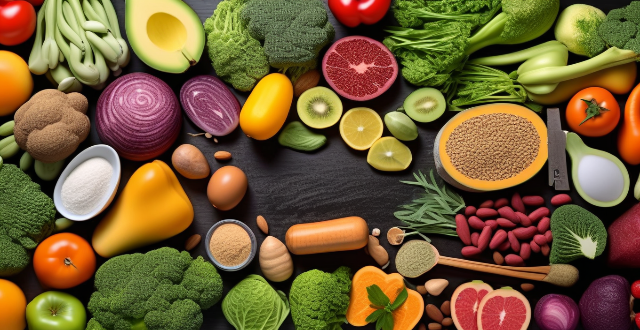
What are the key components of a healthy breakfast ?
A healthy breakfast should include a variety of nutrients to provide energy and support overall health. The key components are whole grains, protein, fruits and vegetables, healthy fats, and dairy or non-dairy alternatives. Whole grains provide complex carbohydrates, fiber, vitamins, and minerals. Protein is important for building and repairing tissues in the body. Fruits and vegetables provide essential vitamins, minerals, antioxidants, and fiber. Healthy fats are important for brain function and hormone regulation. Dairy products or non-dairy alternatives provide calcium, vitamin D, and other important nutrients. Simple combinations like oatmeal with nuts and fruit, a veggie omelette with whole wheat toast, or Greek yogurt with berries and granola can provide all the key components of a balanced breakfast.

What prenatal vitamins are recommended for women trying to conceive ?
Prenatal vitamins are crucial for women trying to conceive, as they provide the necessary nutrients for a healthy pregnancy and support the development of a growing fetus. Some recommended prenatal vitamins include folic acid, iron, calcium, vitamin D, and multivitamins with folic acid. By ensuring adequate intake of these essential nutrients, women can increase their chances of having a healthy pregnancy and a healthy baby.
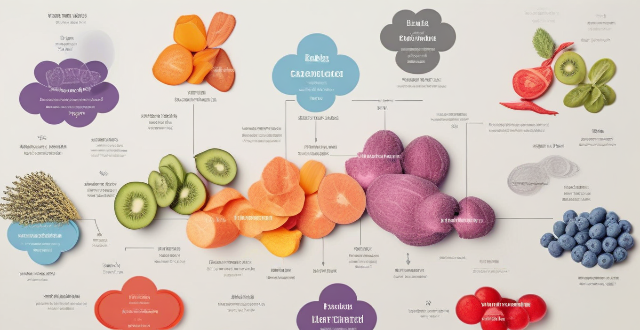
What kind of foods should I eat to aid in muscle recovery
Eating a balanced diet that includes carbohydrates, protein, healthy fats, water, and vitamins and minerals is essential for muscle recovery after exercise. Complex carbohydrates provide energy for muscles during recovery, while protein helps repair and grow them. Healthy fats support overall health and reduce inflammation. Drinking enough water flushes out toxins and maintains a healthy fluid balance in the muscles. Vitamins and minerals, such as vitamin C, vitamin D, and iron, are also important for muscle function and recovery.
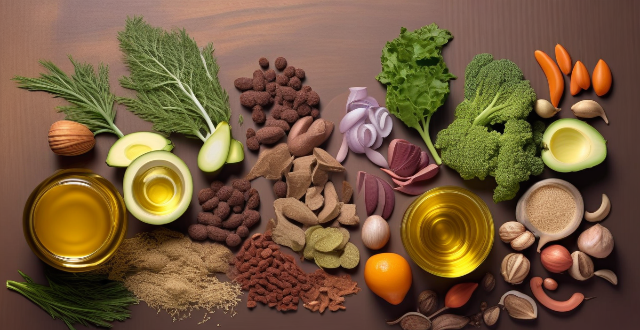
How does a balanced diet contribute to overall well-being ?
A balanced diet is essential for maintaining overall well-being, as it provides the body with the necessary nutrients, vitamins, and minerals required for optimal health and functioning. By consuming a variety of foods in appropriate portions, you can maintain a healthy weight, boost your immune system, support cardiovascular health, enhance brain function and mental health, promote digestive health, and support bone health. Some key nutrients that support these functions include lean protein sources, whole grains, fruits and vegetables rich in vitamins, minerals, and fiber, healthy fats found in nuts, seeds, avocados, and olive oil, omega-3 fatty acids, B vitamins, antioxidants, probiotics, calcium, and vitamin D.
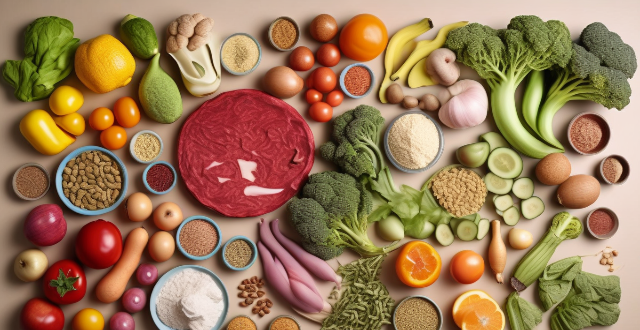
How can a healthy diet improve women's reproductive health ?
A healthy diet is crucial for women's reproductive health, affecting fertility, pregnancy, and menstrual health. Essential nutrients like folic acid and iron support conception and hormone regulation. Calcium, vitamin D, and magnesium can reduce PMS symptoms, while iron-rich and antioxidant-rich foods improve period health. During pregnancy, nutrients like folic acid and iodine are crucial for fetal development, and fiber and hydration maintain maternal health. A balanced diet can also prevent gynecological issues like fibroids and ovarian cysts. Additionally, weight management and mental health through a healthy diet promote overall well-being. Consulting healthcare professionals for personalized dietary advice is recommended.

What are some healthy dinner recipes for weight loss ?
The text provides a list of eight healthy dinner recipes that can aid in weight loss. These recipes include grilled chicken with steamed vegetables, quinoa salad with roasted veggies, salmon with asparagus, lentil soup, turkey chili, stuffed bell peppers, cauliflower rice stir fry, and zucchini noodles with pesto sauce. The text emphasizes the importance of eating a balanced meal before bedtime to maintain a healthy weight and ensure the body gets necessary nutrients for optimal functioning.

What are the benefits of taking vitamin supplements for women ?
The text discusses the benefits of taking vitamin supplements for women, including improved overall health, better skin health, reduced risk of chronic diseases, boosted immune system function, and improved mental health. It also emphasizes the importance of consulting with a healthcare professional before starting any new supplement regimen.

What are some must-have kitchen gadgets for healthy eating ?
In pursuit of healthy eating, having the right kitchen gadgets can significantly improve the preparation and enjoyment of nutritious meals. This article lists essential tools such as a high-quality chef's knife for efficient chopping, a food processor for versatile cooking tasks, a steamer basket for nutrient-rich cooking, and other devices like slow cookers, spiralizers, and immersion blenders that facilitate healthy meal preparation. Each device is discussed in terms of its benefits, uses, and why it is considered essential for healthy cooking. By incorporating these tools into your kitchen setup, you can make preparing healthy meals easier and more enjoyable, setting the foundation for a lifetime of healthy eating habits.

What are the recommended daily allowances of vitamins and minerals for women ?
Vitamins and minerals are crucial for maintaining good health, and women have specific nutritional needs. The recommended daily allowances (RDA) of vitamins and minerals for adult women include various amounts of vitamins A, C, D, E, K, B-complex vitamins, and minerals such as calcium, iron, magnesium, phosphorus, potassium, zinc, copper, manganese, selenium, iodine, chromium, molybdenum, fluoride, and boron. These values are based on the average requirements of healthy adult women but may differ based on factors such as pregnancy, breastfeeding, age, and overall health. It's best to consult with a healthcare professional or registered dietitian to determine individual nutrient needs.

How can I maintain a clean and healthy living environment at home ?
Maintaining a clean and healthy living environment is crucial for family well-being. Tips include regular cleaning, proper ventilation, minimizing clutter, pest control, healthy eating habits, personal hygiene, waste management, and water conservation. These practices promote physical health, mental well-being, and overall happiness for the family.

Can following a vegetarian or vegan diet be considered healthy ?
A vegetarian or vegan diet can indeed be considered healthy, but it depends on how well-planned and balanced the diet is. Here's a detailed analysis: ## **Nutritional Requirements** ### *Protein* Vegetarians can get protein from sources like beans, lentils, tofu, tempeh, and dairy products. Vegans need to rely on plant-based proteins such as legumes, grains, nuts, and seeds. ### *Iron* Plant-based sources of iron include leafy greens, beans, and fortified cereals. However, the absorption rate of non-heme iron (from plants) is lower than heme iron (from animals). Consuming vitamin C-rich foods can enhance iron absorption. ### *Calcium* Vegetarians can get calcium from dairy products. Vegans need to find sources like fortified plant milks, tofu, and certain greens. ### *Vitamin B12* This nutrient is only found naturally in animal products. Vegetarians who consume dairy or eggs don't usually have a deficiency, but vegans must rely on fortified foods or supplements. ### *Omega-3 Fatty Acids* Flaxseeds, chia seeds, hemp seeds, and algae-based supplements are good sources for vegans. Vegetarians can also get it from fish. ## **Potential Health Benefits** - **Lower Risk of Chronic Diseases**: Studies show that vegetarian and vegan diets can reduce the risk of heart disease, high blood pressure, type 2 diabetes, and obesity. - **Healthier Weight**: Plant-based diets tend to be lower in calories and higher in fiber, leading to better weight management. - **Rich in Antioxidants**: Fruits, vegetables, whole grains, and legumes are rich in antioxidants, which help fight inflammation and cellular damage. ## **Challenges and Considerations** - **Nutrient Deficiencies**: Without proper planning, vegetarians and especially vegans may face deficiencies in certain nutrients like vitamin B12, iron, calcium, and omega-3 fatty acids. - **Limited Food Choices**: Avoiding entire food groups can make meal planning more challenging and limit variety. - **Social and Cultural Factors**: Eating out or attending social events where vegetarian or vegan options are not readily available can be difficult. ## **Conclusion** Adopting a vegetarian or vegan diet can be very healthy if it is well-planned and balanced to meet all nutritional needs. It's essential to ensure adequate intake of key nutrients that might be lacking in plant-based diets. Consulting with a registered dietitian can help individuals navigate these challenges and create a sustainable, healthy eating plan.

Is drinking smoothies a part of a healthy diet ?
Drinking smoothies can be a part of a healthy diet, but it depends on the ingredients used and how often you consume them. Smoothies can be nutrient-dense, convenient, and customizable, but they can also be high in calories and sugar if not made properly. To make a healthy smoothie, use whole foods, limit added sugars, add protein, balance flavors, and practice portion control.

What role does hydration play in maintaining healthy skin ?
Hydration plays a crucial role in maintaining healthy skin by moisturizing the skin, regulating body temperature, delivering nutrients to the skin, aiding digestion and detoxification, and boosting immunity. Drinking plenty of water and using moisturizers containing ingredients like hyaluronic acid, glycerin, or ceramides can help keep the skin hydrated and healthy. Proper hydration also supports numerous bodily functions that contribute to overall skin health.

How does nutrition affect women's fertility ?
Nutrition plays a crucial role in women's fertility, affecting both their physical and mental health. Being underweight or overweight can negatively impact fertility, as can a diet that is too low or too high in calories. Vitamins and minerals play important roles in hormone production and metabolism, and deficiencies in certain vitamins and minerals can negatively impact fertility. Eating a balanced, healthy diet that includes plenty of fruits, vegetables, whole grains, lean protein, and healthy fats can improve overall health and fertility. Excessive alcohol consumption, caffeine intake, micronutrient deficiencies, environmental factors like pollution and exposure to toxins, stress, and smoking can also negatively impact fertility. Maintaining a healthy diet, lifestyle, and environment can positively impact women's fertility by supporting overall health and hormone balance.

How can I improve my diet to boost my immune system ?
Improving your diet is one of the best ways to boost your immune system. Here are some tips on how you can do that: ## Eat a Variety of Foods Eating a variety of foods ensures that you get all the essential nutrients your body needs. This includes fruits, vegetables, whole grains, lean proteins, and healthy fats. Aim for at least five servings of fruits and vegetables per day. ### Fruits and Vegetables - Apples - Bananas - Berries - Broccoli - Carrots - Spinach ### Whole Grains - Oats - Quinoa - Brown Rice ### Lean Proteins - Chicken breast - Fish (such as salmon or tuna) - Legumes (such as lentils or chickpeas) ### Healthy Fats - Avocados - Nuts (such as almonds or walnuts) - Seeds (such as chia or flaxseed) ## Stay Hydrated Drinking enough water is crucial for maintaining a healthy immune system. Aim for at least eight glasses of water per day, and more if you're active or it's hot outside. You can also stay hydrated by drinking herbal teas or eating water-rich foods like cucumbers, melons, and strawberries. ## Limit Processed Foods and Sugary Drinks Processed foods and sugary drinks can weaken your immune system by causing inflammation in your body. Try to limit these foods and drinks as much as possible, and opt for whole, nutrient-dense foods instead. ## Consider Taking Supplements If you're not getting enough vitamins and minerals from your diet, consider taking supplements. Some common supplements that may help boost your immune system include vitamin C, vitamin D, zinc, and probiotics. However, be sure to talk to your doctor before starting any new supplements.

What are some common nutrient deficiencies in women and how can they be addressed ?
The text lists common nutrient deficiencies in women, including iron, calcium, vitamin D, folate, vitamin B12, magnesium, and iodine. For each deficiency, it provides symptoms and solutions such as consuming specific foods or taking supplements.

Can certain vitamins improve athletic performance ?
Vitamins play a crucial role in various bodily functions, including metabolism, immunity, and tissue repair. Athletes often seek to optimize their performance by ensuring they have adequate vitamin intake. Certain vitamins like B-complex, Vitamin D, Vitamin C, and vitamins A, C, and E can improve athletic performance by supporting energy metabolism, muscle function, recovery, and immunity. However, it's essential to ensure an adequate intake through a balanced diet and consider supplementation only when necessary and under professional guidance. The key is to find the right balance that works for each individual athlete's unique needs and circumstances.
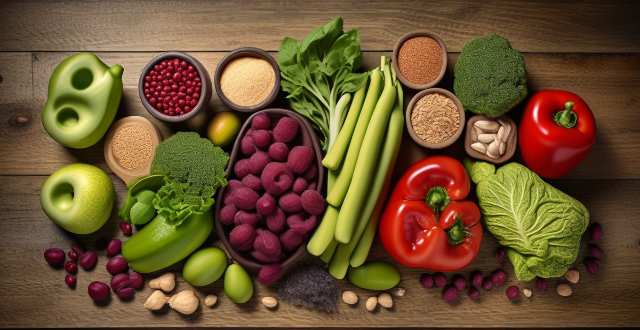
Can eating a healthy diet help with weight loss ?
Eating a healthy diet is crucial for weight loss and overall health. A balanced meal plan can increase satiety, improve nutrient intake, reduce cravings, and enhance digestion. To create a healthy meal plan, focus on whole foods, control portion sizes, choose healthy fats, stay hydrated, and plan ahead. By following these tips, you can achieve your weight loss goals while nourishing your body with essential nutrients.

What are the best practices for sports nutrition in managing a healthy lifestyle ?
Sports nutrition is key to managing a healthy lifestyle. Best practices include staying hydrated, eating a balanced diet with carbohydrates and protein, choosing healthy fats, timing meals around workouts, using supplements cautiously, and prioritizing recovery through rest and proper post-workout nutrition. Consulting with a registered dietitian or healthcare professional can provide personalized advice.

Are there any healthy French dessert options ?
The article discusses the various healthy options for French desserts. It mentions fruit-based desserts like Tarte Tatin and Clafoutis, which use fresh fruits as the main ingredient, providing natural sweetness and fiber. It also suggests using whole wheat flour or almond flour to make these desserts healthier. The article further introduces nut-based desserts such as flourless chocolate cake and walnut and almond cake, which are low in carbohydrates and high in healthy fats and protein. Finally, it concludes that there are many healthy French dessert options available that allow you to indulge in something sweet without compromising your health goals.

How can women maintain a healthy weight through proper nutrition ?
Maintaining a healthy weight is crucial for overall well-being, and proper nutrition plays a vital role in achieving and maintaining it. Women can maintain a healthy weight through proper nutrition by following these tips: 1. Eat a balanced diet consisting of whole grains, fruits, vegetables, lean proteins, and healthy fats. 2. Control portion sizes to prevent overeating. 3. Eat regularly throughout the day to maintain consistent blood sugar levels and prevent overeating. 4. Drink plenty of water to stay hydrated and prevent overeating due to hunger pangs caused by dehydration. 5. Practice mindful eating by being present while you eat and paying attention to your hunger cues rather than relying on external factors like TV or social media to determine when you're full.

In what ways can workplaces promote healthy lifestyle habits among their employees ?
This article explores various ways in which workplaces can encourage healthy lifestyle habits among their employees, including physical activity, healthy eating, mental well-being, and breaks/time off. By implementing strategies such as on-site fitness facilities, flexible working hours, healthy snack options, counseling services, and celebrating milestones, companies can improve productivity, reduce absenteeism, and enhance employee satisfaction. The article concludes that employers who invest in their employees' health and wellness are likely to see long-term benefits for both the individual and the organization as a whole.

How can I make a quick and healthy breakfast in the morning ?
The text provides tips on how to make a quick and healthy breakfast, emphasizing the importance of planning ahead, keeping it simple, using convenience foods wisely, not forgetting protein, and drinking plenty of water. It also offers examples of quick and healthy breakfast options such as overnight oats, Greek yogurt with berries, whole grain toast with avocado, egg, and tomato, and smoothie bowls with frozen fruit, spinach, and almond milk. The text suggests incorporating protein into breakfast by adding eggs, Greek yogurt, cottage cheese, nuts, or seeds to the meal. It also recommends staying hydrated by drinking a glass of water before breakfast and incorporating water-rich fruits like melon or cucumber into the meal.

How does climate change affect children's rights to a healthy environment ?
This article explores the impact of climate change on children's right to a healthy environment, highlighting various health, nutritional, psychological, and educational implications. It emphasizes that addressing climate change is crucial for safeguarding children's rights and future well-being.

How can online platforms be utilized to promote physical activity and healthy lifestyles ?
In the digital age, online platforms have become aIn the digital age, online platforms have become a disseminating information and online platforms have become a pivotal tool for disseminating information and fostering community engagement. These platforms can be effectively utilized to encourage physical activity and promote healthy lifestyles. Here's how: Educational Content Creation: Health and Fitness Blogs share informative articles about the benefits of regular exercise, nutritional guidance, and tips for maintaining a healthy lifestyle. Interactive Q&A Sections encourage readers to ask questions and engage in discussions about health-related topics. Video Tutorials and Workouts post home exercise routines that can be done at home without equipment. Live-Streamed Classes host live workout sessions where participants can join in real time and get motivated by others. Online Challenges and Competitions: Step Challenges use apps that track steps and create challenges for users to reach a certain step count within a given period. Community Leaderboards set up leaderboards to showcase top performers and encourage friendly competition. Healthy Eating Contests challenge participants to share photos of their healthy meals with a dedicated hashtag. Weekly Themes introduce weekly themes like "Meatless Monday" or "Water Wednesday" to focus on specific dietary habits. Social Media Engagement: Inspirational Posts share success stories about individuals who have achieved significant health milestones through physical activity and good nutrition. Daily Motivational Messages post daily messages to inspire followers to stay active and maintain a positive mindset. Interactive Features create fun quizzes related to health facts or polls about preferred types of workouts. Live Chats with Experts organize live chat sessions with fitness coaches or nutritionists for instant advice and tips. Virtual Support Groups: Online Forums and Communities establish forums where people can discuss their progress, challenges, and support each other. Accountability Partners match users with accountability partners to keep each other motivated and on track. Webinars and Workshops host webinars on topics such as stress management, sleep hygiene, and meal planning. Interactive Workshops offer workshops where participants can learn new skills like cooking healthy meals or practicing yoga. Gamification: Rewards and Recognition award badges or certificates to users who complete certain challenges or reach their goals. Points Systems implement a points system where users earn points for exercising or making healthy choices, which can be redeemed for rewards. Fitness App Integration connect popular fitness apps to allow users to sync their data and track their progress more easily. Virtual Reality Games develop or promote VR games that involve physical movement as part of gameplay.